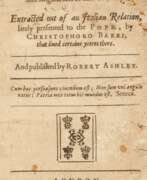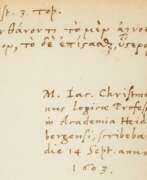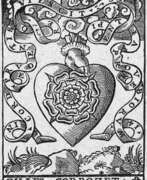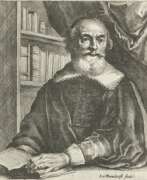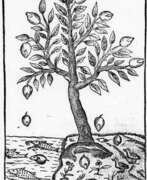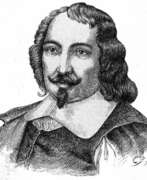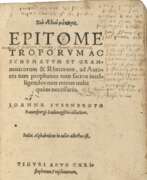Linguists 16th century
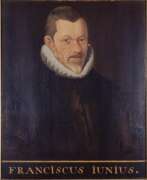

Francis Junius the Elder, born François du Jon, was a French linguist, exegete and professor of Reformed theology, and diplomat.
Junius first studied law and then theology and became a student of Jean Calvin and Theodore Beza in Geneva. For his success and knowledge of languages he was appointed minister at Antwerp, but was forced to flee to Heidelberg in 1567.
In collaboration with Immanuel Tremellius he wrote one of the significant translations of the Bible into Latin, and his theological work De Vera Theologia is the most important work on Reformed dogmatics. Some of du Jon's works were published in 1882 by Abraham Kuyper in his Reformed Library. His son François du Jon the Younger (1591 - 1677) became a noted art historian and founder of Germanic philology.
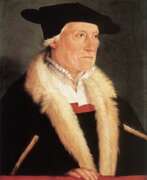

Sebastian Münster was a German Renaissance scholar, cartographer and cosmographer, historian and linguist-translator.
Münster studied at the University of Tübingen and later taught at the Universities of Basel and Heidelberg. He published several editions of Hebrew grammars and translations from that language, and was the first German to produce an edition of the Hebrew Bible.
In 1544 Münster published his Cosmographia, which was the earliest description of the history, geography, and organization of the world in German. This book was a great success, translated into many European languages and reprinted more than twenty times. "Cosmographia" contained many illustrations and geographical maps of the continents of the world, created by the best engravers of the time.
Among his other works were the "Trilingual Dictionary" (1530) in Latin, Greek, and Hebrew and the "Map of Europe" (1536).
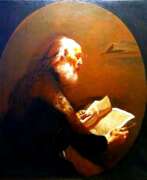

Celio Rodigino (Latin: Caelius Rhodiginus), real name Ludovico Ricchieri, was an Italian writer, educator and Renaissance humanist.
Rodigino studied in Ferrara and Padua, and then was professor of Greek and Latin at Rovigo. In 1515 he became chair of Greek at the University of Milan.
His principal work was Antiquarum Lectionum in sixteen books, published in Venice in 1516. In this work Rodigino collected a considerable number of short essays and notes on Latin and Greek antiquity, from literature, philology, and science to philosophy, history, anthropology, and morality, as well as reflections on ancient music. He also wrote commentaries on Virgil, Ovid, and Horace.
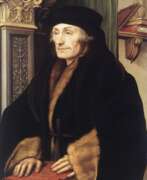

Desiderius Erasmus, also Erasmus of Rotterdam, or simply Erasmus (Latin: Desiderius Erasmus Roterodamus, Dutch: Gerrit Gerritszoon) was a Dutch humanist, philosopher, and the greatest scholar of the Northern Renaissance.
He was illegitimate and brought up under the name Gerhard Gerhards, later in Latin his name was dubbed Desiderius Erasmus. At the age of 13, the boy was sent to a monastery, where he later took the ministry. Erasmus read a lot, improving in Latin and Ancient Greek, studied oratory. A few years later he received the post of secretary to the bishop of the French city of Cambre. From 1493 to 1499 Rotterdam lived in Paris, then in London he was introduced to Thomas More, John Fisher, and John Colet.
Erasmus was constantly on the move, rarely staying in one place and traveling frequently between the Netherlands, Britain, France and Italy. In Turin he earned a doctorate in theology and was received by the Pope, then taught ancient Greek and theology at Cambridge. He corresponded with the rulers of various countries, popes and cardinals, and with statesmen, answering their questions of a scientific, political, and philosophical nature. As a true humanist, Erasmus of Rotterdam adhered to the ideas of a scientific spirit that favored research and true knowledge.
Among the merits of Rotterdamsky study of religious texts from a scientific position, critical interpretation of theology. Erasmus was able to lay the groundwork for historical-critical study of the past, especially in his studies of the Greek New Testament and the church fathers. His educational writings helped to replace the old school curriculum with a new humanistic emphasis on the classics.
In 1501, Erasmus produced a religious and ethical treatise, The Arms of the Christian Warrior, published in 1504. His work entitled "The Praise of Folly" was reprinted 40 times only during the author's lifetime, the book has been translated into all popular languages of the world. The series "Conversations in a Simple Way" (1518-1533) is among the most popular books on pedagogy. Erasmus promoted respect and care for children, opposing violence and corporal influence. He also promoted the idea that education should be compulsory for everyone.
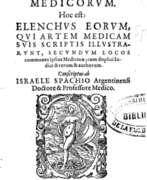

Israël Spach (also Israelis Spachius) was a German and French physician, medical writer and teacher of medicine.
Spach studied at the University of Tübingen, receiving the degree of doctor of medicine, and from 1589 taught medicine and Hebrew at the University of Strasbourg, with the rank of professor of medicine. He was characterized by a high bibliographical education.
Spach was the author of a gynecological encyclopedia, Gynaeciorum sive de mulierum tum communibus, tum gravidarum, parientium, et puerperarum affectibus et morbis, published in Strasbourg in 1597. It was a very significant book for its time.
Israël Spach also wrote Nomenclator scriptorum medicorum..., published in Frankfurt in 1591, which was the first attempt at a bibliography on medical subjects. It was organized under very broad subject headings, with indexes of authors and subjects.
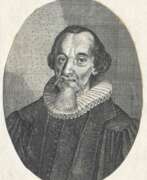

Immanuel Tremellius or Giovanni Emmanuele Tremellio was an Italian reformer, Hebraist, translator, and professor of Hebrew.
Born in Ferrara to a Jewish family, Tremellius was educated in Padua and converted to Catholicism in 1540, but converted to Protestantism a year later and had to move from place to place. He taught Hebrew at Srasburg, at Cambridge, and later became professor of Old Testament at Heidelberg, Germany (1561). He eventually found refuge at Sedan College, where he died.
Immanuel Tremellius' main literary work was a Latin translation of the Bible from Hebrew and Syriac. He also translated Calvin's Catechism into Hebrew and Greek (1551) and published Bucer's Commentary on Ephesians, based on lectures he had heard at Cambridge (1562), as well as an Aramaic and Syriac Grammar (1569).
